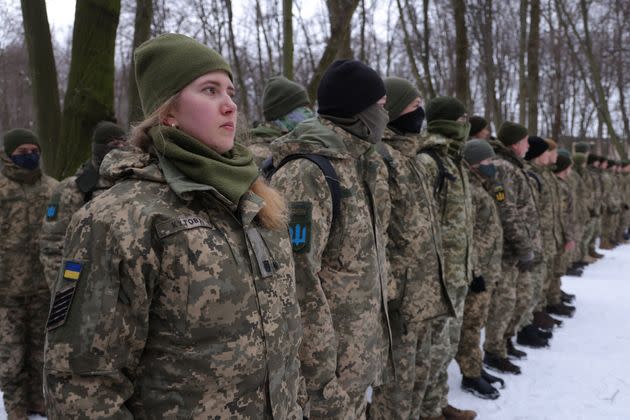Everything You Need To Know About Ukraine And Russia In 4 Minutes

Tensions between Ukraine and Russia have crept into the news cycle in recent days as a Russian invasion is becoming increasingly likely.
With much of the Western world poised to protect Ukraine’s independence, there’s a chance the whole situation could escalate very quickly.
Here’s a breakdown of everything you need to know, in four minutes.
Why is Russia so keen on Ukraine?
The two countries share a border, and between 1919 and 1991 Ukraine was part of the Soviet Union. Ukraine declared independence from the Soviet Union in the early-1990s but maintained close economic and cultural links with Russia.
Russia has been trying to reunite with its neighbour even since, with Russian president Vladimir Putin calling the break-up of the Soviet bloc the “greatest geopolitical tragedy of the 20th century”.
But Ukraine has been moving in a different direction. Kiev’s closer ties with the European Union, and the overthrow of the country’s last pro-Russian leader, prompted Russia to annexe Crimea, in Ukraine territory, in 2014.
Why have tensions increased recently?
Tensions have been lingering ever since the annexation. But over the last few months, the situation has escalated as Russia has amassed around 100,000 troops near the border of Ukraine.
It’s not entirely clear why Putin is acting now. There’s speculation he may be moving because the US looks weak following the messy evacuation from Afghanistan.
He may also be acting over growing fears that Ukraine is becoming too “anti-Russian” and slipping out of his grasp.
Divisions in the EU over how to address Russia could have added to his decision to move in on Ukraine now, as could the soaring oil and gas prices hitting the EU and the US, giving Putin more leverage.
He has issued a long list of security demands and said he will only retract his troops if these demands are met.
In the meantime, Ukraine has been trying to join the EU and Nato as it continues trying to establish itself apart from Russia.
OK – Why should I care?
While it may seem like this is happening far away from the UK, Europe actually gets about 40% of its gas imports from Russia, meaning military tensions could have a significant impact on Britain’s already struggling energy supply.
Several UK ministers have also deflected questions about the Downing Street parties by talking about the ongoing situation in East Europe between Ukraine and Russia.
While it has been dubbed a diversionary tactic by some critics, the UK, the US and the EU are all unavoidably involved with this crisis through membership of Nato (North Atlantic Treaty Organisation).

What is Nato?
This is an alliance between 30 countries including the UK, the US, Canada, Germany and France.
Nato was initially formed after the Second World War as a defence alliance against possible attacks from the Soviet Union.
It has now evolved to protect the “freedom and security of its members”.
Russia does not want Ukraine to join Nato
This was just one of Putin’s many demands in exchange for withdrawing troops from the Ukrainian border.
The US has already rejected this key demand from Russia.
What are the UK, the US and EU saying?
Johnson warned Putin that a Russian invasion would trigger a “painful, violent and bloody” war and that the UK stands “fully foursquare with the people of Ukraine”.
He said the UK was leading global efforts to put economic sanctions on Russia if it were to cross borders into Ukraine.
However, he maintained war was still not “inevitable”, although deputy prime minister Dominic Raab said there was “a very significant risk” of invasion.
US president Biden said there would be “enormous consequences” for the world if Russia made a move on Ukraine.
President of the European Council, Charles Michel, said any aggression against Ukraine would have serious consequences, as “a threat against Ukraine is a threat against Europe”.
Why is Germany a concern?
Chancellor Olaf Scholz has promised that Russia would suffer “high costs” in the event of a military intervention, but has held back from explaining particular measures, like sanctions.
The country is one of the most powerful nations in the EU, and so without its full cooperation, united action against Russia could falter.
It’s believed this reluctance comes down to gas – Russia and Germany are connected by the Nord Stream 2 undersea gas pipeline, which is key to German consumers as gas remains essential to running its energy supply.
Germany receives a third of its natural gas from Russia.
The country is also withdrawing from nuclear power and coal, which will only increase its reliance on natural gas as a stopgap while the country prepares to become carbon neutral by 2050.
The pipeline will also serve the demand coming from the rest of northern Europe.
Ukrainian president Volodymyr Zelensky has described the pipeline as a “dangerous geopolitical weapon”.
What will happen next?
A lot hinges on whether Russia does make an offensive move towards Ukraine anytime.
Russia’s government spokesman said Putin is currently assessing the proposals from the US – described as a “serious diplomatic path forward”.

This article originally appeared on HuffPost UK and has been updated.

 Yahoo News
Yahoo News 


